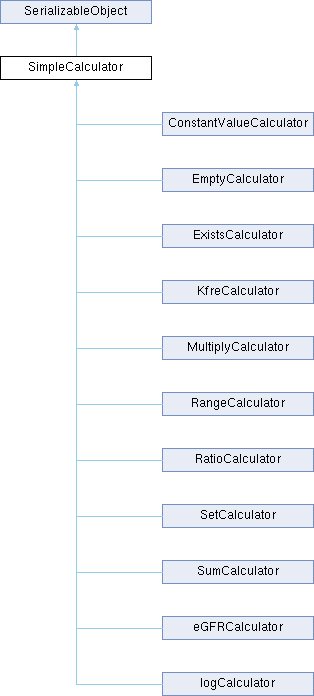RepCalcSimpleSignals is a rep processor containing several calculators to calculate new signals. More...
#include <RepProcess.h>

Public Member Functions | |
| virtual int | init (map< string, string > &mapper) |
| init function of calculator | |
| virtual void | validate_arguments (const vector< string > &input_signals, const vector< string > &output_signals) const |
| validates correctness of inputs | |
| virtual bool | do_calc (const vector< float > &vals, float &res) const |
| the calc option | |
| virtual void | list_output_signals (const vector< string > &input_signals, vector< pair< string, string > > &_virtual_signals, const string &output_type) |
| list output signals with default naming | |
| virtual void | init_tables (MedDictionarySections &dict, MedSignals &sigs, const vector< string > &input_signals) |
| init operator based on repo if needed | |
| virtual void | get_required_signal_categories (unordered_map< string, vector< string > > &signal_categories_in_use) const |
| virtual void | fit_for_repository (MedPidRepository &rep, vector< pair< string, string > > &_virtual_signals) |
| void * | new_polymorphic (string derived_class_name) |
| for polymorphic classes that want to be able to serialize/deserialize a pointer * to the derived class given its type one needs to implement this function to return a new to the derived class given its type (as in my_type) | |
 Public Member Functions inherited from SerializableObject Public Member Functions inherited from SerializableObject | |
| virtual int | version () const |
| Relevant for serializations. | |
| virtual string | my_class_name () const |
| For better handling of serializations it is highly recommended that each SerializableObject inheriting class will implement the next method. | |
| virtual void | serialized_fields_name (vector< string > &field_names) const |
| The names of the serialized fields. | |
| virtual void | pre_serialization () |
| virtual void | post_deserialization () |
| virtual size_t | get_size () |
| Gets bytes sizes for serializations. | |
| virtual size_t | serialize (unsigned char *blob) |
| Serialiazing object to blob memory. return number ob bytes wrote to memory. | |
| virtual size_t | deserialize (unsigned char *blob) |
| Deserialiazing blob to object. returns number of bytes read. | |
| size_t | serialize_vec (vector< unsigned char > &blob) |
| size_t | deserialize_vec (vector< unsigned char > &blob) |
| virtual size_t | serialize (vector< unsigned char > &blob) |
| virtual size_t | deserialize (vector< unsigned char > &blob) |
| virtual int | read_from_file (const string &fname) |
| read and deserialize model | |
| virtual int | write_to_file (const string &fname) |
| serialize model and write to file | |
| virtual int | read_from_file_unsafe (const string &fname) |
| read and deserialize model without checking version number - unsafe read | |
| int | init_from_string (string init_string) |
| Init from string. | |
| int | init_params_from_file (string init_file) |
| int | init_param_from_file (string file_str, string ¶m) |
| int | update_from_string (const string &init_string) |
| virtual int | update (map< string, string > &map) |
| Virtual to update object from parsed fields. | |
| virtual string | object_json () const |
Static Public Member Functions | |
| static SimpleCalculator * | make_calculator (const string &calc_type) |
Detailed Description
RepCalcSimpleSignals is a rep processor containing several calculators to calculate new signals.
It supports an internal list of calculators, and the user can select one of them.
Each calculator can create one or more new virtual signals. Each of these has a specific type. The user can configure the virtual signal names, and can also pass a list of float parameters to the calculator, making it parametric.
When adding a new calculator make sure to : (1) fill in the calc2defs map (as explained below), to define the calculator name, type, req signals, default virual names and their types, and default parameters. (2) add the new calculator type to the enum (3) write the matching _apply function for the specific calculator and make sure the general _apply calls it .
NOTE: in RepCalcSimpleSignals there is NO learning. Calculated signals that have a learning stage should be implmented in a separate class that will also have space to keep the learning process results.
supported signals calculated (this will be also the virtual signal name):
calc_eGFR : calculating EGFR (CKD_EPI formula) at each point in which Creatinine is available Abstract class for calculator - has do_calc which recieves vector for values to calculate
Member Function Documentation
◆ do_calc()
|
inlinevirtual |
the calc option
Reimplemented in EmptyCalculator, RatioCalculator, KfreCalculator, eGFRCalculator, logCalculator, SumCalculator, RangeCalculator, MultiplyCalculator, SetCalculator, ExistsCalculator, and ConstantValueCalculator.
◆ init()
|
inlinevirtual |
init function of calculator
Reimplemented from SerializableObject.
Reimplemented in RatioCalculator, KfreCalculator, eGFRCalculator, logCalculator, SumCalculator, RangeCalculator, MultiplyCalculator, SetCalculator, ExistsCalculator, and ConstantValueCalculator.
◆ init_tables()
|
inlinevirtual |
init operator based on repo if needed
Reimplemented in SetCalculator.
◆ list_output_signals()
|
inlinevirtual |
list output signals with default naming
Reimplemented in EmptyCalculator, RatioCalculator, KfreCalculator, eGFRCalculator, logCalculator, SumCalculator, RangeCalculator, MultiplyCalculator, SetCalculator, ExistsCalculator, and ConstantValueCalculator.
◆ make_calculator()
|
static |
◆ new_polymorphic()
|
virtual |
for polymorphic classes that want to be able to serialize/deserialize a pointer * to the derived class given its type one needs to implement this function to return a new to the derived class given its type (as in my_type)
Reimplemented from SerializableObject.
◆ validate_arguments()
|
inlinevirtual |
validates correctness of inputs
Reimplemented in EmptyCalculator, RatioCalculator, KfreCalculator, eGFRCalculator, logCalculator, SumCalculator, RangeCalculator, MultiplyCalculator, SetCalculator, ExistsCalculator, and ConstantValueCalculator.
The documentation for this class was generated from the following files:
- Internal/MedProcessTools/MedProcessTools/RepProcess.h
- Internal/MedProcessTools/MedProcessTools/RepCalculators.cpp
- Internal/MedProcessTools/MedProcessTools/RepProcess.cpp